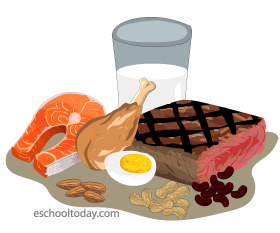- Nutrients in food
Proteins in food
Proteins are very complex molecules that are needed for cell structure, function, regulation, and repair. Unlike carbohydrates and other nutrients, proteins are the building blocks themselves.
Living cells, tissues, and organs are all made of proteins. Proteins are made up of small building blocks called amino acids that are joined together in chains. These chains may contain a few amino acids or contain thousands of amino acids. They are very complex, and the chains can fold up in many complex ways, making them three-dimensional.
Examples of proteins:
- One good example of protein is hemoglobin, the protein that carries oxygen to all parts of the body. This protein is spherical.
- Another example is a protein called keratin. Keratin is built in long strands or fibers. This is the protein that makes our hairs.
- Casein is another protein. It is a storage protein in the milk of mammals. It supplies the nutrients that babies need to grow.

There are about 20 or so different amino acids, that combine to build thousands of proteins in the human body. Out of the 20, the body can manufacture about 12 of them on its own.
The foods we eat provide the additional eight amino acids needed. Amino acids obtained from our foods are called essential amino acids.
Everyone who eats meat usually gets all the essential amino acids.
Vegetarians may miss out a bit as one or two of these essential amino acids are found only in some plant foods.
Meat, poultry, seafood, beans, soy, legumes nuts, and seeds are all great protein foods. Adults need more protein than kids, but they must be, by all means, part of a healthy balanced diet.
